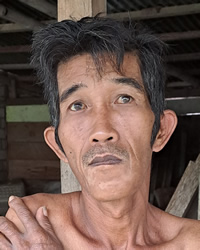Tombelala in Indonesia

Photo Source:
Anonymous
|
Send Joshua Project a map of this people group.
|
| People Name: | Tombelala |
| Country: | Indonesia |
| 10/40 Window: | Yes |
| Population: | 7,500 |
| World Population: | 7,500 |
| Primary Language: | Tombelala |
| Primary Religion: | Islam |
| Christian Adherents: | 0.00 % |
| Evangelicals: | 0.00 % |
| Scripture: | Translation Started |
| Ministry Resources: | No |
| Jesus Film: | No |
| Audio Recordings: | No |
| People Cluster: | Kaili-Tomini of Sulawesi |
| Affinity Bloc: | Malay Peoples |
| Progress Level: |
|
Introduction / History
The Tombelala people are also called Baria, Belala, or Mbelala. They consider their people group to have originated from Tojo Una-Una (now a regency) in Central Sulawesi. According to the story of their cultural chiefs, the king of Tojo Una-Una heard news that the Bungku people threw away their plates and glasses after every party. So he sent a messenger to Bungku to find out if it was true or not. It turned out that the news was true. But the king's messenger never returned; he simply stayed in the Bungku area.
Previously, in Tojo Una-Una, this tribe was called Tambilala (which comes from the word Tambi which means kitchen), but in further development it became Tombelala. This tribe previously lived in the villages of Olom Tobu, Wedinalu and Rahatapea (in Tojo Una-Una Regency). But during the Dutch colonial period (1699–1945) they were obliged to come down and live near the coastal area. Then the Bungku king gave them the land on which they now live, in the villages of Lamberea, Bente, Bahoruru, Saketa and Matansala in Central Bungku District of Morowali Regency in Central Sulawesi Province. Most Tombelala people live in Lamberea Village.
Adult Tombelala people use Tombelala language, which linguists classify as part of the same language group as the Pamona language in Central Sulawesi. This fits with the story of the cultural leaders who consider themselves part of the Tojo Una-Una people. However, the Tombelala language is headed toward extinction because children aged 15 years and under do not use it at all. It is not part of the elementary school curriculum and children are not taught it at home.
What Are Their Lives Like?
Every year after the rice harvest the Tombelala hold an annual ceremony during which many of their traditional arts are displayed. As part of this ceremony Tombelala values of togetherness and cooperation are demonstrated. Those who have gotten an abundant harvest share with those who have gotten only a small harvest.
What Are Their Beliefs?
Before the Tombelala moved to Bungku, they were Christian, but since moving and settling in the Bungku area, none of them are Christian. They are now all Muslim, with traditional customs mixed with Islamic practices, especially during Ramadan. Among every few houses there is a dengu-dengu, a tower above which is a small house, about 2X3 meters, filled with various traditional musical instruments. They play these instruments before the pre-dawn meal and before breaking the fast to remind people to perform fasting well. Usually, they start playing the music 30 minutes before breaking the fast and 30 minutes before the pre-dawn meal.
Prayer Points
Pray for a spiritual hunger that will take them from being pragmatic about religion to finding the glorious Savior.
Pray for Tombelala disciples who will make more disciples.
Pray for loving and dedicated workers.